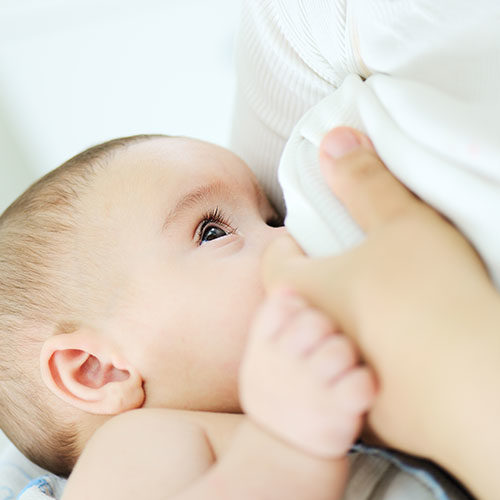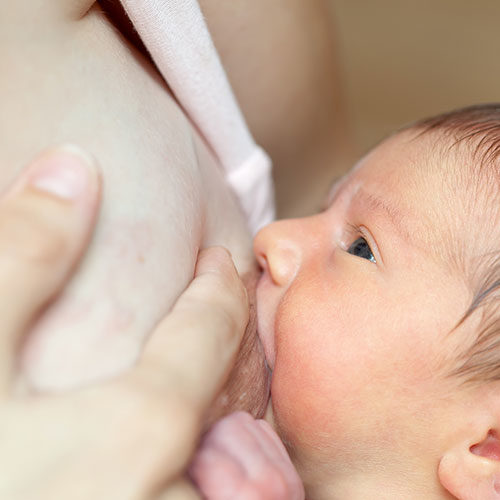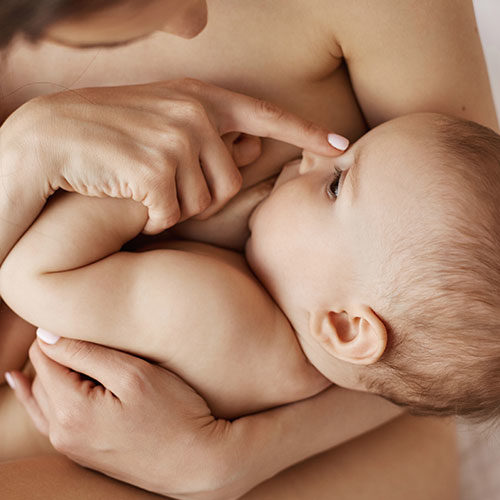What should be a weight gain pattern in breastfed babies?
When we talk about full-term healthy babies, nearly all of them lose weight post-birth. Any loss of weight between the range of 5% to 7% is considered normal. Some babies might lose up to 10% of their birth weight. Once the weight loss crosses the 10% mark, it is a concern and should be brought to the notice of a paediatrician. A weight loss of more than 15% is alarming and needs immediate medical attention.
After losing weight initially, babies start gaining it again from day-4. A reference guide to follow the weight gain pattern in babies can help monitor and determine growth. The following table provides a reference point.

It is important to note that babies come in all sizes and chubby babies do not necessarily mean healthy babies. As long as the baby follows her own growth curve and is not dropping percentiles on her weight chart, the baby is doing well.
How to weigh the baby?
There are certain guidelines to measure the baby’s weight. They help to get accurate measurements.
1) Always weigh the baby at the same scale
In most cases, this can be the regular paediatrician’s clinic. The one change that happens and needs to be acknowledged here is that – at birth, the baby is weighed at the birthing facility. The scale there and the scale at the paediatrician’s clinic could potentially give varying readings. Even though the readings are not drastically different, the difference may be significant as at this stage, even subtle changes in the baby’s weight can indicate a lot. One thing that can work as a great practice is to weigh the baby at the birthing facility at the time of discharge and the going to the paediatrician’s clinic to weigh the baby can potentially help understand the difference between the two scales. The baby can always be measured at the paediatrician’s clinic from that point onwards.
2) Always weigh the baby in the same manner.
This typically means the baby’s clothing while being weighed. It includes clothes and diapers. If the baby is weighed without clothes and diapers the first time, she should be weighed in the exact same manner (without clothes and diaper) each time to get an accurate and reliable idea of how much weight she has gained.
3) Indirect weighing at home should not be relied upon.
Some parents have reported weighing their babies at home indirectly. This method consists of a parent weighing her/himself first and then weighing oneself again while carrying the baby and then finding the difference between the two readings to derive the baby’s weight. This practice is highly unreliable and does not yield accurate measurements. Any conclusion based on this method can be extremely questionable.
Factors other than breastfeeding having an impact on baby’s weight gain
- The IV fluid given to the mother during labour can result in inflated birth weight of the baby. Such a baby loses more weight initially in order to regulate her hydration. In some cases, this weight loss may go above 10% without having any problem in breastfeeding. This can cause unnecessary concern, sometimes followed by unnecessary actions and treatment.
- Sometimes, if the baby passes stool right before being weighed, the weight reading can come less than expected. This can show a significant weight loss during the very early days. A large poop can reduce the baby’s weight up to 50-70 grams. In such cases, the baby should be nursed and weighed again after a gap.
- An illness can cause weight loss or a pause in weight gain among babies. However, regular cold, cough etc should not make any difference. The baby might just gain weight a little slowly for a while and makes up for it soon.
- Introducing solids earlier than 6 months can cause slow weight gain or even weight loss. The main source of nutrition for a baby is breast milk until the baby turns 1 year old. Thus, the baby should be continued to be nursed on demand even after introducing solids at the completion of 6 months.
- Many babies gain very good weight in an initial couple of months. Weight gain naturally slows down a little after the age of 3-4 months. As long as the baby is meeting other criteria and is otherwise healthy and active, it should not be a concern.
References:
https://kellymom.com/bf/normal/weight-gain/
http://www.nancymohrbacher.com/articles/2011/10/31/newborn-weight-loss-and-iv-fluids-in-labor.html

Wish to speak with a member of our team who is a certified lactation professional and also an experienced breastfeeding mother, click on this link.
Medical Advice Disclaimer
THIS WEBSITE DOES NOT PROVIDE MEDICAL ADVICE.
The information, including but not limited to, text, graphics, images and other material contained on this website are for informational purposes only. No material on this site is intended to be a substitute for professional medical advice, diagnosis or treatment. Always seek the advice of your physician or other qualified health care provider with any questions you may have regarding a medical condition or treatment before undertaking a new health care regimen, and never disregard professional medical advice or delay in seeking it because of something you have read on this website.
Disclaimer
We understand and acknowledge that parents and babies can be of various genders on a spectrum of LGBTQI+. Families come in diverse flavours. However, in our articles, for the sake of simplicity and convenience, we will be referring to the breastfeeding parent as the mother and using the female pronouns- ‘she’ and ‘her’ for babies. Babies can be nourished and nurtured in different ways and while we have used the terms breastfeeding and nursing, we recognize that parents can opt to chest feed or finger feed.
We don’t have conflicts of interest and declare, and we are compliant with the WHO code of marketing of breastmilk substitutes and the IMS act.
In case you find any information on this website that needs to be updated, please write to us at info@bsim.org.in






